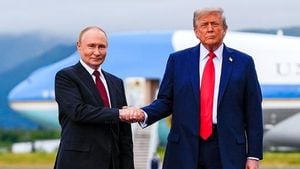Trade tensions between the European Union and China have intensified recently, especially concerning electric vehicles (EVs). A pivotal moment is just around the corner, with the EU set to potentially vote on tariffs targeting Chinese-made electric cars on October 3, 2024. This vote could signal significant changes for European car manufacturers and consumers alike, as these tariffs are scheduled to take effect by November 2024. The issue remains hotly debated, with uncertainty surrounding whether the proposed tariffs will receive sufficient support to be enacted.
According to Nikkei Asia, the vote could have far-reaching consequences, depending on the stance taken by various EU member states. It's important to note here what constitutes the needed majority—15 member nations representing at least 65% of the EU's total population must support the tariffs for them to be put in place. Currently, there is evident division among EU countries, with some supporting the tariffs as necessary protection against what they see as unfair competition from Chinese EVs, and others wary of potential retaliatory measures from Beijing.
During this uncertain phase, negotiations continue between the European Commission and China to establish a "price commitment" agreement. This proposed deal seeks to set a minimum price for Chinese electric vehicles entering European markets, which aims to alleviate concerns over dumping—where products are sold below their normal value to gain market share.
Lobbying efforts have ramped up, highlighted by the visit of Chinese Trade Minister Wang Wentao to Europe earlier this month. Wang engaged with EU officials and national leaders, advocating against the tariffs. Historically, countries like France, Italy, and Spain have expressed strong support for punitive measures against Chinese EVs, representing around 40% of the EU's population. Yet, Spain has since signaled it may reconsider its position, and France has reiterated its opposition.
The precarious situation for Germany has been particularly notable, as the country has deep ties to the Chinese automotive market. With fears of Chinese retaliation looming over German exports, there exists internal conflict, especially concerning the future of major car manufacturers like Volkswagen. This turmoil plays out against the backdrop of negotiations between the government and labor unions concerning potential plant closings, creating a pressure cooker of economic interests.
German Vice-Chancellor Robert Habeck has emphasized the need for continued dialogue, advocating for free trade and urging collaboration rather than confrontation between European and Chinese automotive interests. Following his discussions with Wang Wentao, Habeck reiterated the importance of finding solutions conducive to both sides, particularly emphasizing the value of Chinese investment within the EU.
The concept of flexible pricing emerged during discussions on September 19, when Wang met with Valdis Dombrovskis, the European Commission's trade commissioner. Imposing flexible pricing for Chinese electric vehicles could serve as a compromise to imposed tariffs, potentially easing some of the trade friction.
Meanwhile, the stakes extend beyond EU-China relations. The looming question of tariffs has broader implications for both the economic climate within Europe and the future of the electric vehicle market, which is at the forefront of the automotive industry's evolution. Analysts speculate about the possible impact these tariffs may have, not just on car costs but also on consumer choices and the competitive capabilities of European automakers.
More broadly, the dynamics between various EU nations reflect the complicated nature of global trade today, highlighting the tensions inherent in protecting domestic industries versus engaging with international partners. Germany’s hesitance, particularly, raises concerns over balancing national interests with the collective stance of the EU, especially as many member states may stand to benefit from continued Chinese investment and market access.
With the vote approaching, all eyes will be on the negotiations and the responses from both sides as the EU attempts to navigate its future relationship with one of its largest trading partners. Whether the tariffs will be approved, or whether alternative solutions like the proposed price commitments will take their place, remains to be seen. What is clear is this—October 3 could be pivotal for the EU's trade posture and its relationship with the Chinese automotive sector.



